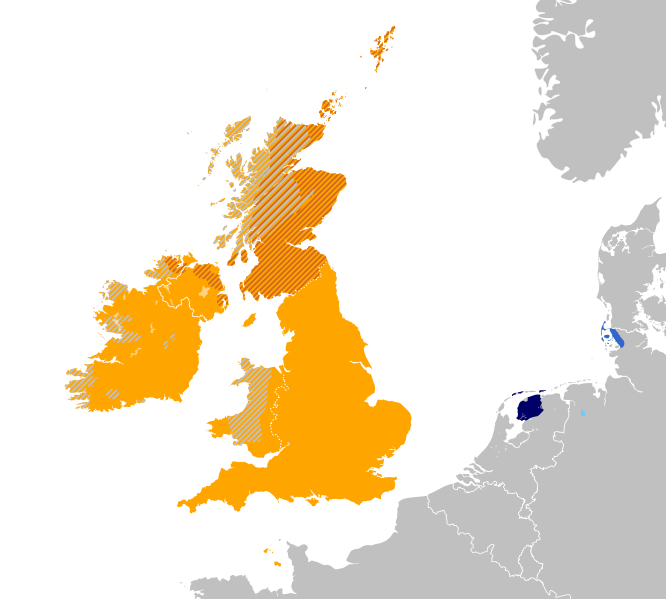English Language
English Orthography (Spelling)
English Linguistics
History of the English language
English is a West Germanic language that originated from the Anglo-Frisian dialects, brought to Britain by Germanic invaders and/or settlers from the places which are now called North West Germany and the Netherlands. It uses a vocabulary disparate to other European languages of the same era. A large portion of the modern English vocabulary came from the Anglo-Norman languages. English is considered as a "borrowing" language.
The saying "As milk is to cheese, are English and Fries" describes the dairy similarity between Frisian and English.
Another rhyme that is sometimes used to demonstrate the palpable similarity between Frisian and English is
"Rye bread, butter and green cheese is good English and good Fries.",
which sounds not tremendously different from
"Brea, bûter en griene tsiis is goed Ingelsk en goed Frysk."

Approximate present day distribution of the Anglo-Frisian languages in Europe.
Anglic |
Frisian |
Hatched areas indicate where multilingualism is common.
History of The English Language (1943)
History of The English Language (1943) from British Council Film on Vimeo.
Middle English differed from Old English because of two invasions which occurred during the Middle Ages. The 1st invasion was by peoples who spoke North Germanic languages. They conquered and colonized parts of Britain during the 8th and 9th centuries A.D. The 2nd invasion was by the Normans of the 11th century, who spoke Old Norman and eventually developed an English form thereof called Anglo-Norman. New vocabulary used beginning in the time of Middle English heavily influenced many organizations including the church, the court system and the government. European languages including German, Dutch, Latin and Ancient Greek influenced the English vocabulary during the Renaissance.
Old English initially was a diverse group of dialects, reflecting the varied origins of the Anglo-Saxon kingdoms of Britain. The Late West Saxon dialect eventually became dominant. Written Old English of 1000 A.D. was similar to other Germanic languages such as Old High German and Old Norse in terms of vocabulary and grammar. Written Old English is relatively unintelligible in contrast to written Modern English and written Middle English. Close contact with the Scandinavians caused much grammatical simplification and lexical enrichment of the English language's Anglo-Frisian bases. These changes did not reach South West England until the Norman Invasion of 1066 A.D. Old English there developed into a full-fledged literary language and became based on the most common manner of speaking in London during the 13th century A.D. The English language thereby reflected Britain's exposure to the language of Scandinavia.
- Formal and informal forms of the second person singular and plural
| Old English | Middle English | Modern English | ||||||||||
| Singular | Plural | Singular | Plural | Singular | Plural | |||||||
| Case | Formal | Informal | Formal | Informal | Formal | Informal | Formal | Informal | Formal | Informal | Formal | Informal |
| Nominative | þū | ġē | you | thou | you | ye | you | |||||
| Accusative | þē / þeċ | ēow / ēowiċ | thee | you | ||||||||
| Dative | þē | ēow | ||||||||||
| Genitive | þīn | ēower | your, yours | thy, thine | your, yours | your, yours | ||||||
Here the letter þ (interchangeable with ð in manuscripts) corresponds to th.
(Old English also had a separate dual, ȝit ("ye two") etcetera; however, no later forms derive from it.)
The History of English in 10 Minutes

See also:
History of English

Connect With Us